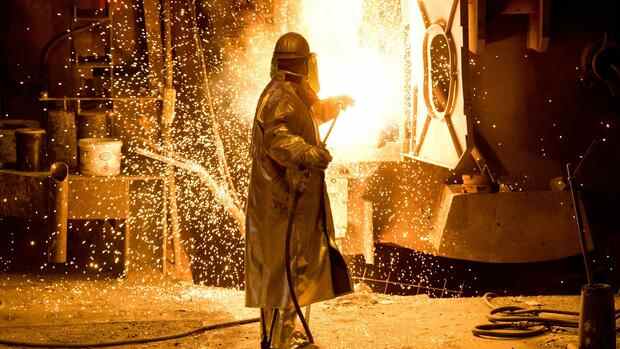Berlin An abrupt halt to Russian energy supplies could plunge the German economy into a historic crisis. At least that is the conclusion reached by the economist Tom Krebs from the University of Mannheim in a study published on Monday. A gas embargo would cause German economic output to collapse by up to twelve percent within the first year – a loss of almost half a trillion euros.
It is possible that a gas embargo would only lead to an economic slump like in the corona pandemic of 2020 and in the financial crisis of 2009. However, it “could also lead to an economic crisis such as (West) Germany has not experienced since the Second World War,” warns Krebs.
In any case, the social consequences are more serious than in 2020 and 2009, because after two years of the pandemic, the economy is already under stress due to global supply chain problems and the fight against climate change.
Krebs’ calculations are probably noticed particularly intensively in the federal government. Recently, concerns had increased that Russian President Vladimir Putin could turn off the gas tap for Germany as a retaliatory measure. Germany’s neighboring country Poland did not want to pay its gas bills in rubles, which led to an abrupt halt to deliveries there. Germany does not pay in rubles either, but has agreed an alternative solution with the Russian Gazprombank. However, it is unclear whether Putin will accept this permanently.
Top jobs of the day
Find the best jobs now and
be notified by email.
At the same time, the government remains vehemently opposed to a total embargo on Russian energy to deter Putin from his war in Ukraine. A coal delivery stop has already been decided. The EU Commission also wants to follow suit when it comes to oil, and Germany is now also supporting this. But Brussels has so far ruled out a short-term gas embargo – especially because Germany is slowing down.
Good contacts in the federal government
Germany still gets about a third of its natural gas from Russia. Economics Minister Robert Habeck (Greens) justifies the German veto with significant macroeconomic effects from a gas embargo, even “social peace” would be endangered.
>> Read also: Germany still 35 percent dependent on Russian gas – Habeck wants to “try the unrealistic”
The federal government has been sharply criticized both nationally and abroad for this attitude. Some consider Habeck’s statements to be far exaggerated. Studies on the consequences of an embargo, which forecast the consequences to be significantly lower, put the minister under pressure. The figures for the economic slump have so far ranged from 0.5 to six percent.
Krebs’ results are therefore all the more remarkable. The economist maintains good contacts in the federal government. In the Economics Ministry, he pointed out early on what he saw as neglected aspects in other embargo studies. Habeck’s line of argument is sometimes based on the arguments put forward by Krebs.
The economist is Professor of Macroeconomics at the University of Mannheim and academic director at the Forum New Economy. Before moving to Mannheim, he did research in the USA.
(Photo: Alex Kraus/Kapix)
He has now translated this into figures in detail. According to his study, the economy would suffer three to eight percent damage because the lack of gas would limit the production of companies. Higher energy prices and general uncertainty would also ensure that consumers could spend less money on other goods. That would cost another two to four percent.
The range of the forecast is a result of the lack of clarity about the extent to which Germany can get gas from other countries and how adaptable the German economy would be if the gas supply were stopped.
“Cascading Effects” five times direct damage
If the government’s plans to source gas from other countries were met, while reducing the use of gas by businesses and consumers, there would be a supply gap of 41 percent. If the government finds an additional 190 terawatt hours of gas outside of Russia, the economic damage would be significantly less and the industry would only be short of 16 percent of gas. This is theoretically possible, but not yet foreseeable.
The lack of gas would first cause damage in the energy-intensive industry due to production stops. This includes the chemical, metal production and processing, foundries, glass and ceramics, stone and earth, nutrition, paper industry and machine and vehicle construction sectors.
>> Read also: Analysis of the consequences of an energy embargo
However, most of the negative effects were secondary effects, because the lack of products from the basic industry would collapse various value chains, for example because there could be a lack of metals for car construction or paper packaging in retail.
Krebs estimates that these consequential damages would be five times greater than the direct effects. Imports of the preliminary products from other countries could hardly dampen this. However, these assumptions are controversial among economists. Some researchers accuse colleagues like Krebs of underestimating the adaptability and alternatives from other countries
Krebs’ assumption is based on observations made after the 2011 nuclear disaster in Fukushima, Japan. However, it is questionable whether the breakdown of a nuclear power plant as a result of a sudden natural disaster can be compared with a prepared, announced stop in gas supplies.
In addition, Krebs adds the consequences for consumers due to higher prices and increased uncertainty, using data from the Bundesbank, the German Council of Economic Experts and the Institute for Macroeconomics and Business Cycle Research. Krebs’ conclusion: an abrupt halt to the supply of Russian gas is “highly risky”. The federal government should stick to its plan to exit by 2024.
More: Germany still 35 percent dependent on Russian gas – Habeck wants to “try the unrealistic”
